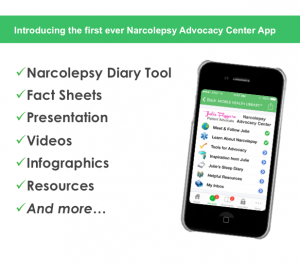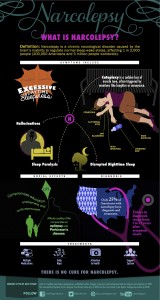“What is it like to have Narcolepsy?” Communication Tips
Narcolepsy is a neurological disorder of the sleep/wake cycle affecting 1 in every 2,000 people. As a person with narcolepsy, it can be overwhelming to explain the symptoms and affects on life.
 Typical Questions about Narcolepsy and Simple Answers:
Typical Questions about Narcolepsy and Simple Answers:
Provided by Julie Flygare’s Narcolepsy Mobile App – FREE download today!
Q: What is narcolepsy?
A: Narcolepsy is a neurological disorder of the sleep/wake cycle.
Q: So that’s where you fall asleep all the time?
A: Sleepiness is an aspect of narcolepsy, but it’s a much more complicated disorder. The timing of my sleepiness is “off” – so I may fight sleep during the day but be unable to sleep at night.
Q: Could you fall asleep right now?
A: Probably not. I experience episodes of extreme sleepiness, but it’s generally brought on by situations that would make anyone tired (like dark rooms, hot rooms, or jet-lag), but these situations make me 100 times more tired than normal.
Q: What are symptoms of narcolepsy?
A: Narcolepsy involves: Excessive Daytime Sleepiness, Cataplexy (muscle weakness with emotions), Hypnogogic hallucinations (vivid realistic dreams), and Sleep paralysis (inability to move upon falling asleep or waking). Not everyone has all symptoms to the same degree.
Q: Were you born with narcolepsy?
A: No, people aren’t born with narcolepsy. It usually develops in childhood, teens or early 20’s.
Q: How does narcolepsy develop?
A: It’s believed to be an autoimmune disorder in which brain cells called “hypocretin” deteriorate. Scientists are working on understanding this process.
Q: I’ve never met anyone else with narcolepsy. Is it rare?
A: Narcolepsy affects 1 in 2,000 people – about 200,000 Americans and 3 million people worldwide. Only 25% have proper diagnosis and treatment. Narcolepsy is often misdiagnosed as epilepsy, depression, or schizophrenia.
Q: Is there treatment?
A: I manage my symptoms by taking medication twice a day and twice a night. I also nap everyday. The best medications improve my symptoms, but make me sick in other ways. It’s a give and take.
Q: Does narcolepsy impact your life?
A: Narcolepsy challenges me daily. Studies suggest narcolepsy affects quality of life comparable to epilepsy and Parkinson’s disease. Undiagnosed, narcolepsy presents major safety concerns, compromises education, employment, and personal relations.
Q: Is there a cure?
A: There is currently no cure, but scientists are working towards better solutions, so hopefully someday!
Please adapt these to fit your experience. Provided by: Julie Flygare’s Narcolepsy Mobile App – FREE download today!
Communication Tips:
1. Keep it short – less is more. If someone is interested, they will follow-up.
2. Avoid big “science-y” words, they are meaningless to average people.
3. Maintain positive demeanor – the info may be serious, but a positive attitude adds credibility and invites listener to ask more.
 9 useful narcolepsy resources to share with friends and family:
9 useful narcolepsy resources to share with friends and family:
– 10 Things You Didn’t Know about Narcolepsy
– Narcolepsy Infographic
– 16 Secret Signs of Excessive Daytime Sleepiness
– Narcolepsy Fact Sheet
– Narcolepsy Video Series
– Sleep’s Choice: Living with Narcolepsy’s Excessive Daytime Sleepiness
– Narcolepsy Mobile App
– Why Advocate for Narcolepsy
– Wide Awake and Dreaming: A Memoir of Narcolepsy